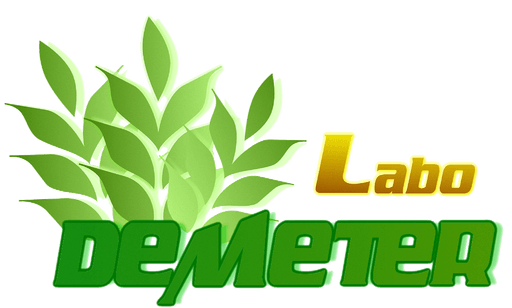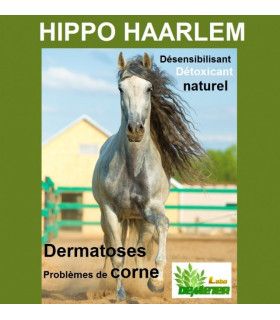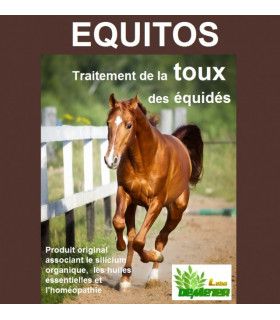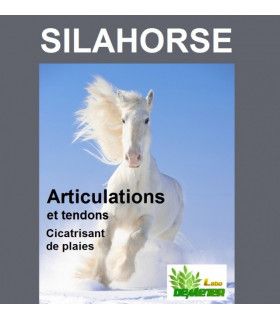Prévenir et guérir l'allergie du cheval
Prevent and cure horse allergies
Without a doubt, the ideal approach to allergy is to avoid the allergen, which is the substance that is causing the reaction in your pet, as this does not require medication and the symptoms will go away. when the allergen is eliminated. This is seldom possible, however, as most allergens from the environment are impossible to avoid. In addition, most "atopic" animals are allergic to several substances at the same time.
WHAT IS ALLERGY IN HORSES?
Allergy is characterized by a disproportionate immune response, the body defends itself against an element of its environment that it would normally tolerate without reacting. The immune system "gets it wrong" by treating something that is not aggressive, and begins to fight against it, by developing all the mechanisms of inflammation. Very often the allergen in question is a grain of pollen, a mite or a mold. But for allergic horses, these elements trigger a reaction of the defenses which is too important and harms the organism itself. Birch, a tree whose pollen is one of the first to appear in early spring, and very often implicated in pollen allergy.
ALLERGENS
As explained above, allergens are elements that can trigger symptoms in horses which have a predisposed organism and are at risk of expressing symptoms. We distinguish: Respiratory allergens, entering the body through the respiratory tract: pollens, molds Food allergens, being ingested: it depends on the horse, it can be any food, but some are more frequent than others ( in horses we find corn, soybeans, etc.). Contact allergens: through the skin, through the skin, such as certain plants where all it takes is one contact to trigger a reaction. Injected allergens: this category includes all venoms, bees, wasps, horseflies, but also Culicoides midges responsible for the well-known Recurrent Equine Allergic Dermatitis (DERE), and the dreaded anaphylactic shocks linked to drug allergies.
SYMPTOMS OF ALLERGIES IN HORSES
The reactions are expressed through 4 means:
- THE SKIN :
Urticaria lesions (subcutaneous swelling without wounds, the skin remains intact) or eczema-type dermatitis (more superficial skin lesions, with small wounds or scabs, the skin is damaged and grainy).
- LUNGS :
Chronic inflammation, lungs stuffed with mucus, with cough and intolerance to exertion, and a tendency for bronchial spasms which lead to asthma-like symptoms.
- THE DIGESTIVE SYSTEM:
Difficult digestion, with diarrhea, dull colic (abdominal pain), poor shape, fatigue, loss of appetite, loss of tone.
- THE EYES :
Runny eyes, anaphylactic shock-like reactions. The route of entry of the allergen does not have to influence the symptoms: A food allergen can give digestive symptoms A food allergen can give skin symptoms A respiratory allergen can give respiratory symptoms A respiratory allergen can give eye symptoms An inoculated allergen can give cutaneous symptoms (case of the DERE for example) And so on….
DIAGNOSTIC
It is difficult when the symptoms are nonspecific, such as respiratory or digestive signs, and often not thought about until other leads have been ruled out. It is easier in cases of urticaria, or anaphylactic shock (in the latter case unfortunately the diagnosis is often made post-mortem). The diagnosis is primarily clinical, and can be used as an eviction-reintroduction test in the case of food allergy. The diagnosis can be made by skin tests or blood tests, but which result in numerous false-positives and false-negatives, the reliability of which leaves much to be desired.
TREATMENT AND CARE
The first step is to remove the allergen (s) incriminated in the horse's environment. This is relatively easy with a food allergy. This is almost impossible when it comes to pollens, exposure can be reduced by "dusting" the hay as much as possible (hay dust contains many pollen grains). Desensitization can help the horse, but it is only effective if the number of allergens involved is low, it is impossible to desensitize to more than 10 allergens, which is often the case for pollens. If the triggering allergen (s) cannot be eliminated, the consequences remain to be treated, which most often results in anti-inflammatory treatments of the cortisone type, by trying as much as possible to anticipate and react at the first signs in order to avoid using large doses.
CARE PRODUCTS
All insect repellants will be helpful, especially against the onset of summer dermatitis. Specialized supplements for allergies and skin comfort like Hippo Haarlem from Labo Demeter. Supplements acting on respiratory comfort can also help your horse like Equitos by Labo Demeter.





